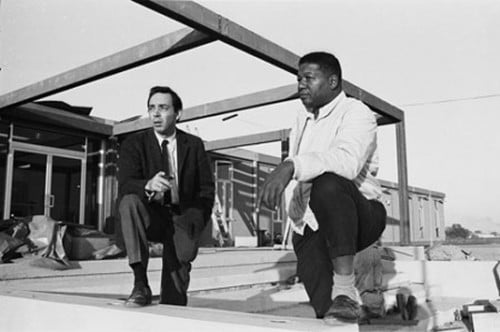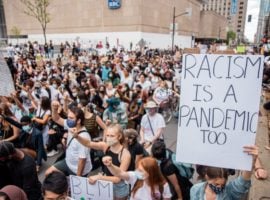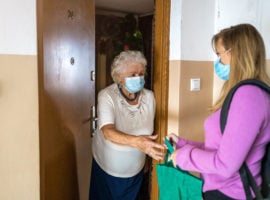By Judy Belue, Director of the Delta Fresh Foods Initiative (DFFI). DFFI is a coalition of community stakeholders committed to establishing sustainable, equitable food systems in the Mississippi Delta.
 Dr. H. Jack Geiger with Dr. John W. Hatch during construction on the Delta Health Center, 1968.
Dr. H. Jack Geiger with Dr. John W. Hatch during construction on the Delta Health Center, 1968.
Dr. H. Jack Geiger came to the Mississippi Delta fifty years ago during the Mississippi Freedom Summer of 1964. His work as a field coordinator for the Medical Committee for Human Rights led him to understand the direct connections between poverty, health, social equity and access to basic human rights such as healthy food and clean water. Having studied in South Africa during medical school, he’d seen a model for community health care rooted in community empowerment, and set out to replicate (along with a sister clinic in Boston) the first community health center in the United States — the Delta Health Center in Mound Bayou, MS. The Delta Health Center (DHC) was the beginning of the community health center movement which today has 1,200 community health centers with 9,300 sites serving nearly 23 million patients each year nationwide.
Dr. Geiger and others established DHC in 1967 not just as a medical care facility but as a community-based institution that embraced a holistic, community-invested approach to achieve and maintain better patient health. Members of the community were active participants in the DHC, serving as board members and staff members in direct opposition to the racist assumptions that poor black residents were unable to participate in decisions regarding their personal health and the future of the community. In addition to traditional medical services (including home care provided by nurses to accommodate the distances rural folk were required to travel for basic services), Dr. Geiger began prescribing “food as medicine” and established production farms in the community to provide fresh fruits and vegetables to patients. When called upon to defend his practice of writing actual prescriptions for food, Dr. Geiger silenced the skeptics by famously responding “the last time I checked my medical texts, the treatment for malnutrition was food.” Today prescribing food and other basic resources to prevent illness is the new paradigm in health care treatment.
On Saturday, August 16, 2014, the Delta Health Center in Mound Bayou celebrated the dedication of its new 26,000 square foot state-of-the-art medical center in honor of Dr. H. Jack Geiger. The Center is a testament to Dr. Geiger’s vision and leadership in binding together food, medicine and civil rights, and to the progress that has been made in providing accessible health care to Delta communities in Bolivar, Sunflower and Washington counties.
The Delta Fresh Foods Initiative (DFFI) was very honored to be recognized as a DHC partner at the grand opening event. As a part of our mission to build sustainable, equitable and local food systems, Delta Fresh Foods Initiative recently installed “edible” landscaping in front of the Center. A flourishing raised bed vegetable garden and numerous fruit trees and bushes are already providing patients with free access to fresh, locally grown produce. This year, DFFI will install additional edible landscaping at the expanded Geiger Center as well as at their clinic in the Indianola community in partnership with DFFI member, My Brother’s Keeper.
We are proud to participate in the great legacy of the Delta Health Center, and we see this as a great step toward establishing statewide institutional commitment to including and supporting fresher, more nutritious and sustainable local foods to all of our communities.
For more information about Delta Health Center, contact Ann Jackson at 202-374-5700. For more information and updates regarding the Delta Fresh Foods Initiative, visit www.deltafreshfoods.org or call Judy Belue at 662-404-5004.
WhyHunger began working with community organization in the Mississippi Delta in 2010, which grew into the Delta Fresh Foods Initiative. WhyHunger continues to support the growth of the coalition. To learn more, see Building Community Power, a hub for the stories, resources and impact from WhyHunger’s four-year collaboration with grassroots networks.





